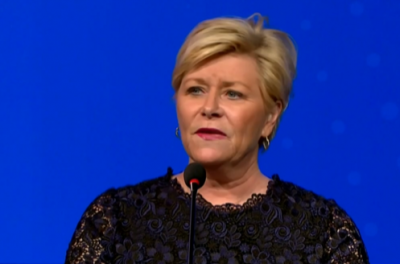NEWS ANALYSIS: Just three years after being forced to resign as justice minister over some typically inflammatory remarks, Sylvi Listhaug has been tapped to succeed outgoing Progress Party leader Siv Jensen. Listhaug has a history of provoking or taunting those who challenge her, a trait Jensen now seems to view as important to revive voter support.

“I have had the pleasure of working closely with her (Listhaug) for many years,” Jensen said after confirming speculation Thursday afternoon that she was stepping down as leader after 15 years at the Progress Party’s helm.
“I have seen her develop and take on steadily more responsibility,” Jensen continued at her hastily called press conference. “She’s a tough woman who’s neither afraid of conflicts nor of hard work.”
Asked why Jensen recommended Listhaug as her successor instead of her other deputy party leader, the popular and more mild-mannered Ketil Solvik-Olsen, Jensen told reporters that it was because Listhaug agreed to run again for a seat in Parliament. “Ketil hasn’t done that,” Jensen said. “I don’t know of any party that’s well-served by having a party leader who doesn’t sit in Parliament.”
‘So sad’ she’s quitting
She also thinks Listhaug and Solvik-Olsen, whom she’s recommending to continue as deputy party leader, “will complement” one another. That suggests a kind of “good-cop/bad-cop” situation in which Listhaug will probably do her best to challenge and often offend opposition politicians, leaving Solvik-Olsen to smooth things over. Critics warn Listhaug will take the party in a far more nationalistic direction, championing anti-immigration policy and continuing to promote Norway’s increasingly controversial oil industry.
Listhaug appeared unusually humble after Jensen suddenly announced that she wanted “to do something else” and did not want to stand for re-election as party leader at its annual national meeting in May. “It’s so sad that you’re quitting as leader, Siv,” Listhaug wrote on social media Thursday evening. “Thank you for your fantastic contribution for so many years! You have made a formidable contribution!”

Jensen steered the party into government power for the first time ever in 2013, winning 16.3 percent of the vote and forming a government coalition led by Erna Solberg of the Conservatives. Jensen, who took over as Progress Party leader in 2006, guided its rise over many years by proving to be a more moderate and rational voice among Norway’s most right-wing, anti-immigration and often offensive politicians. She made the party palatable to far more people and could claim voter support of more than 20 percent at some points.
The party has endured plenty of scandals along the way, though, and has become a shadow of its former self in the past year. After leaving Solberg’s coalition last January, Listhaug famously declared that it felt like the party had been “let out prison” and it briefly rose in the public opinion polls. Then came the Corona crisis, however, with Solberg firmly leading a suddenly, even fiercely, united nation. Most all other party leaders were left in her shadow, not least the right-wing Progress Party that had little choice but to side with left-wing parties on various issues in efforts to assert themselves.
Falling in the polls
Progress dove in the polls, with one recently showing them with less than 7 percent of voter support. Progress, long disparaged as Norway’s leading populist party, also found itself losing even that role to the protectionist, rural-oriented Center Party. It’s been soaring in the polls, not least after trying to lure away many of Progress’ voters.
Solberg said she was also sad that Jensen was stepping down. “Siv is the one politician from other parties with whom I’ve worked the most closely during the past decade,” Solberg said. The two women seemed to work well together, with Solberg as prime minister and Jensen as finance minister with a strong national economy. “I will miss her in Norwegian politics,” Solberg said.

Jensen, age 51, probably won’t leave politics altogether but has decided not to remain a candidate for a seat in Parliament at the September election. Political commentators noted that it’s probably too late to significantly boost Progress’ standings before the next election, with Lars Nehru Sand of NRK suspecting the change at the top was made more with an eye to recapturing voters prior to the election in 2025.
After 15 years leading what can only be described as a rowdy and often noisy party, Jensen said herself said she simply wasn’t as motivated as she once was. She also claimed she wants to spend more time with her closest family and ageing mother and become a better aunt for her sister Nina Jensen’s little boy. Nina Jensen, former head of WWF in Norway who now leads ocean research work for industrialist Kjell Inge Røkke, recently lost her partner to cancer just after their son was born. The two sisters are close and Siv Jensen, who’s single, now wants to do more than work with politics “24 hours a day. You’ve never free.”
Labour Party leader Jonas Gahr Støre, who leads the opposition in Parliament, called Jensen “a professional political opponent. It’s been possible to cooperate with her and rely upon her on issues where we’ve agreed.” That’s more than he may be willing to say about Listhaug, who famously had to resign as justice minister after provocatively claiming that Labour was more concerned with the rights of terrorists than national security. Labour was the main target of a right-wing extremist who launched twin attacks on the government and a labour youth camp in 2011. Listhaug was forced to apologize on the floor of Parliament and then resign her post, although she later returned as oil minister.
Jensen denied she was abandoning a party that’s lost more than half its voters since leaving government. She stressed that her decision to resign “has to do with me. I need to do something different, I need more time for myself and I feel a need to use my capacity for work on something other than what I’ve done for the past 24 years.” She later added, while appearing on NRK’s nightly national newscast, that “who knows? Maybe a new offer will come around.”
NewsInEnglish.no/Nina Berglund

